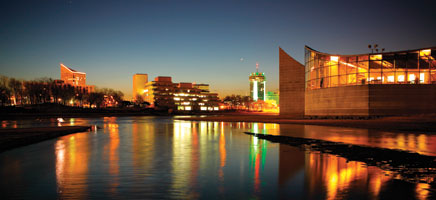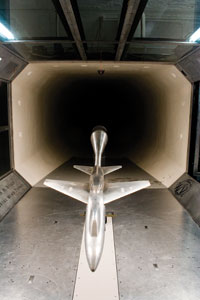In terms of recruiting new businesses to Kansas, Fiscal Year 2010 came in like a lion … and it went out like one, too.
In fact, Fiscal Year 2010 was the state’s most successful business recruitment year in recent history. Between July 2009 and July 2010, the Kansas Department of Commerce facilitated 68 relocation projects to Kansas ─ headlined by healthcare leader Cerner and financial giants J.P. Morgan and U.S. Bank ─ totaling 13,900 new jobs and more than $838 million in capital investment. During that same period, the state’s unemployment rate fell from 7.2 percent to 6.5 percent.
“It's been a great year for Kansas in terms of recruiting global leaders,” said Secretary of Commerce Bill Thornton. “Especially in light of the gloomy headlines about the national economy, we're proud that Kansas continues to attract premier companies that see our state as a great place to grow.”
To many observers, Kansas’ recent recruitment streak isn’t surprising. Kansas continues to be a hotbed for progressive economic development policies and is among the nation’s 10 most business-friendly states, according to CNBC and Pollina Corporate Real Estate. More importantly, the state’s innovative policymaking is already paying dividends in the form of a stronger and more diverse economy, new job creation and increased entrepreneurial activity. Kansas has maintained its historic dominance in industries like aviation manufacturing and agriculture, while strengthening its status as one of the nation’s fastest-growing biotechnology hubs. Meanwhile, the state has welcomed national and international companies from nearly every major economic sector, along with the jobs and capital investment that come with them.
“We’re certainly excited by the success we’ve had,” Thornton said. “The simple truth is that few states can match our economic assets, and that’s why more and more companies are choosing to come here.”
 So what is it about Kansas that’s catching the eye of businesses around the world? Part of the answer is the state’s portfolio of financial incentives for companies considering a move to ─ or expansion in ─ Kansas. That portfolio grew with the 2010 Kansas Legislature’s expansion of the Promoting Employment Across Kansas (PEAK) incentive program, which allows qualified companies that are creating jobs to retain 95 percent of the payroll withholding tax of the new jobs over a period of five or more years. The PEAK incentive has been instrumental in many of the state’s recent recruitment successes, including Hoefer Wysocki Architects (65 jobs) and KeyBank (300 jobs).
So what is it about Kansas that’s catching the eye of businesses around the world? Part of the answer is the state’s portfolio of financial incentives for companies considering a move to ─ or expansion in ─ Kansas. That portfolio grew with the 2010 Kansas Legislature’s expansion of the Promoting Employment Across Kansas (PEAK) incentive program, which allows qualified companies that are creating jobs to retain 95 percent of the payroll withholding tax of the new jobs over a period of five or more years. The PEAK incentive has been instrumental in many of the state’s recent recruitment successes, including Hoefer Wysocki Architects (65 jobs) and KeyBank (300 jobs).
Of course, pro-business legislation is nothing new in Kansas. In 2007, the Legislature passed legislation to phase out the corporation franchise tax over the next five years and reduce unemployment insurance rates for businesses in good standing, measures strongly endorsed by the state’s business community. In addition to these newest incentives, Kansas continues to offer income and premium tax credits for new job creation; sales tax exemptions on the purchase of construction labor and materials, and facility machinery and equipment; property tax abatements; industrial revenue bonds; Community Development Block Grants for projects in non-metro areas; and forgivable loans for project-related costs.
But it’s more than just incentives. Kansas boasts a central location and access to interstate rail, trucking and air corridors that put the state’s businesses within next-day freight service of nearly 70 percent of the United States. Kansas maintains the nation’s best state-owned road and highway system, according to Reader’s Digest, and access to Kansas City, Mo., the nation’s second-leading rail center. In addition, a new Burlington Northern Santa Fe Railways intermodal facility is currently under development in the Kansas City suburb of Gardner. This facility is projected to be an enormous asset to the state’s aviation and bioscience clusters, and it may also anchor the development of a new cluster of distribution centers in northeast Kansas.
Kansas also has one of the most skilled labor pools in the nation, a direct result of having one of the nation’s premier education systems. Kansas ranks in the top third nationally for percent of adults with a college degree, average ACT score, pupil-to- teacher ratio and students per computer. The state commits 37 percent of overall spending to education, which is the 14th best rate in the country and a significantly higher percentage than that of New York and California. Kansas’ higher education system includes six Kansas Board of Regents universities, 19 community colleges, 10 technical colleges and schools and one municipal college. Moreover, these institutions are remarkably affordable. A study by the Kansas Board of Regents shows tuition and fees at the state’s six regents universities compare favorably with colleges in five neighboring states and fall significantly below the regional average.
“No matter how you look at it, Kansas is a great place for business,” Thornton said. “We’re already realizing the benefits of past investments in public infrastructure, education and pro-business policies. And we continue to position ourselves for even bigger gains in the future.”

